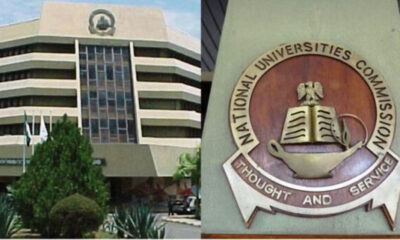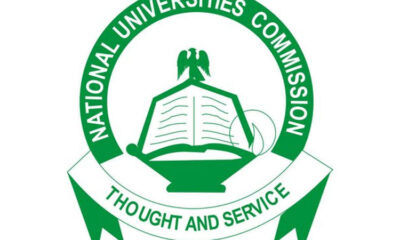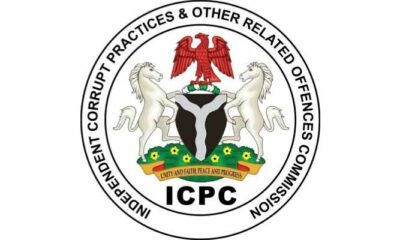Education
Implementation of new varsity curriculum begins September — NUC

Implementation of new varsity curriculum begins September — NUC
National Universities Commission (NUC) has revealed that the implementation of the new Core Curriculum Minimum Academic Standards (CCMAS) will commence by September 2023 in line with the Federal government’s efforts to reposition and revitalize Nigerian universities.
In the same light, the Federal government has tasked tertiary institutions in the country to strengthen their quality mechanism in producing graduates who are highly skilled and employable to contribute to national development efforts.
Acting Executive Secretary of NUC, Mr Chris Maiyaki, speaking at the Stakeholders’ Colloquium on CCMAS on Wednesday in Abuja said the document would reposition Nigerian universities to be among the best rated in Africa.
He added that CCMAS was designed to guide institutions on development of curricula for their programmes while bringing necessary innovation into the content and delivery of their programmes towards achieving the overall goals of education and training in the country.
Maiyaki said that CCMAS would make up 70 per cent of the curriculum while the university decides what to include in the remaining 30 per cent.
He noted the reviewed curriculum is endowed with unique features tailored to meet the evolving demands of the rapidly changing world, adding that it emphasises interdisciplinary learning, soft and critical skills development, entrepreneurship and value creation.
The NUC boss added, ”The role and development of the CCMAS is to ensure commitment in advancing our education and great nation.
”NUC is primarily dedicated to ensuring quality and global competitiveness of Nigerian universities as well as the graduates we produce.
” The development of the CCMAS went through a painstaking process by bringing experts from our universities comprising of professors, regulatory bodies, Nigerian Economic Summit Group (NESG) and all stakeholders.
‘The CCMAS reflects global initiative that will equip graduates with knowledge and wherewithal that will advance the development of the nation,” he said.
Minister of Education, Prof. Tahir Mamman, in his remark, said President Bola Ahmed Tinubu-led administration is unwaveringly committed to the continuous repositioning and revitalisation of the entire education sector for a quickened socio-economic development of Nigeria.
He urged universities to make optimal use of the 30 per cent university senate’s input, stressing that tertiary institutions in the country must strengthen their quality mechanism to ensure that graduates who are produced are highly skilled and employable to contribute to national development efforts.
Mamman advised universities to ensure that learning outcomes, skills as well and soft skills were acquired, irrespective of the core discipline.
He said that the skills must be readily applicable to the environment of the university, the country in particular and the global community in general.
”There is no better place and time than now to develop a strategy that will guide tertiary institutions particularly universities in their mandate to provide appropriate manpower for the country.
”This is through using a curriculum and applying minimum standards that would guarantee we teach our students in such a way and manner that they would be highly skilled and employable to contribute to national development efforts.
READ ALSO:
-
UK pledges enhanced synergy with Nigerian army
-
94-year-old man nab for raping teenage girl in Adamawa
-
Naira depreciates, trades at N773.42/$ in investors and exporters window
” 70 per cent of the total curriculum is captured in the CCMAS while 30 per cent of the curriculum has been ceded to universities Senates to build in the uniqueness of their various universities.
”This principle allows for a good deal of adaptation that suits not only local peculiarities of the universities but provides universities opportunities to carve a niche for themselves in areas of comparative advantage,” he said.
The minister commended universities who had concluded their work on the 30 per cent component and submitted same for review.
He also urged those who have not to endeavour to do so in the shortest possible time as the next academic session rolls in.
He pledged the commitment of the Federal Government in ensuring that our education system remained nationally relevant and globally competitive.
In a keynote address, Former Vice Chancellor, Obafemi Awolowo University, Ile-Ife, Prof. Michael Faborode said the idea of the CCMAS was to promote diversification and differentiation in the system.
This he said was to provide proper conceptual administrative guidelines and a harmonised legal framework for higher education.
Faborode commended the over 70 per cent universities that had already complied with the uploading of their 30 per cent curriculum inputs into the CCMAS.
He said this was the way to go so that universities could be globally relevant and competitive and as well provide the educational needs to the students so they could be employable after graduation.
CCMAS was developed in 2018 following the review of the Benchmark Minimum Academic Standards (BMAS) –the curriculum guide for Nigerian universities, which had been in use since 2007.
The CCMAS also expanded BMAS from 12 to 17 disciplines to reposition the system to reflect the realities of the 21st century.
The 17 disciplines are Administration and Management, Agriculture, Allied Health Sciences, Architecture, Arts, Basic Medical Sciences, Communication and Media Studies, Computing and Education.
Others are Engineering and Technology, Environmental Sciences, Law, Medicine and Dentistry, Pharmaceutical Sciences, Sciences, Social Sciences and Veterinary Medicine.
Implementation of new varsity curriculum begins September — NUC
Education
Poly lecturers to embark on nationwide strike from Dec 2

Poly lecturers to embark on nationwide strike from Dec 2
The Chairman of the Academic Staff Union of Polytechnics (ASUP), Kaduna Polytechnic Chapter, Comrade Abubakar J. Abdullah, said the union will shut down all polytechnics nationwide by December 2 due to the Federal Government’s failure to meet its demands.
He explained that the union leadership issued a 15-day ultimatum to the Federal Government on October 6, 2024, outlining pressing demands aimed at resolving the systemic challenges that hinder the progress of polytechnics. However, he said the government failed to address the issues.
Speaking at a news briefing on Tuesday, Nov. 26, in Kaduna, the chairman listed some of the demands, including swift release of the second tranche of the NEEDS Assessment Intervention fund, immediate implementation of the approved 25/35% salary review across all public polytechnics, and the payment of accrued arrears.
READ ALSO:
- Gunmen abduct three people from Anambra community
- Tron Founder joins Trump-backed crypto project, invests $30m
- Drama as Yahaya Bello calms supporters after judge storms out of court over rowdiness
Other demands are the release and final resolution of the decades-long arrears of CONTISS-15 migration for lower cadres, the release of outstanding promotion arrears, addressing inadequate funding, and resolving the issue of unpaid allowances.
“Regrettably, as we passed the deadline of this ultimatum, we are yet to see the necessary actions from the Federal Government to address these pressing demands. The silence and inaction have left us with no option but to consider the possibility of a total shutdown of our institutions, scheduled for December 2nd, 2024, should our concerns remain unaddressed,” he said.
Comrade Abdullahi said the survival and quality of the educational system hinged upon the government’s responsiveness.
He stated that the union believe that a strong education sector is vital for the future of the nation and cannot afford to compromise on these issues any longer.
He urged the Federal Government to engage in meaningful dialogue with the union and take decisive steps towards resolving these challenges.
Poly lecturers to embark on nationwide strike from Dec 2
Education
US University opens 2025 scholarships for international students

US University opens 2025 scholarships for international students
Montana Technological University (Montana Tech) has opened applications for its 2025 scholarships, offering international students the opportunity to pursue graduate studies in the USA.
These scholarships, available for both Master’s (MS) and PhD students, provide a tuition waiver and a competitive stipend for living expenses.
Scholarship overview and opportunities
Scholarship Region reports that Montana Technological University is offering funded Graduate Research Assistantships (GRAs) for Fall 2025. These assistantships are available for students applying to the MS and PhD programs, and they provide an opportunity to work alongside faculty on important research projects.
The university is focusing on key research areas such as advanced materials and manufacturing, critical mineral recovery and processing, environmental remediation, and biotechnology. Interested applicants are encouraged to apply soon to contribute to these cutting-edge fields.
Eligibility requirements
To apply for the Montana Tech University Scholarship 2025, candidates must meet several criteria.
- Applicants should have completed a bachelor’s degree from a recognized university.
- They must also meet the admission requirements for the program they wish to apply to and satisfy the English language proficiency requirements set by the university.
- Additionally, applicants must submit their applications for admission by January 1st to be considered for the scholarship.
READ ALSO:
- 200,000 repentant terrorists surrender, drop arms in North East – CDS
- Canadian university offers funded national scholarship program for 2025
- Israeli strikes pound central Beirut, suburbs
Benefits for scholarship winners
Students who are accepted into the MS or PhD programs at Montana Tech and are awarded a Graduate Research Assistantship will receive significant benefits. These include a
- Tuition waiver and a competitive stipend to cover living expenses.
- All applicants to available graduate programs will automatically be considered for the assistantships.
Required documents for application
Details inform that candidates applying for the Montana Technological University Scholarship must prepare several documents as part of the application process. Required documents include the;
- Application form,
- A personal statement,
- A CV, recommendation letters,
- TOEFL or IELTS scores, GRE scores, and official academic transcripts.
These documents as mentioned, are crucial for the admissions review and scholarship consideration.
Step-by-step application process
To apply for the scholarship, candidates are informed to first visit the graduate research fields page on Montana Tech’s Graduate School website. From there, they can apply for openings in the available research areas and complete the application form.
All required documents must be uploaded as part of the application. For more details and guidance, prospective students can contact the Montana Tech Graduate School at [email protected], where they will be connected with a faculty member leading a funded project.
US University opens 2025 scholarships for international students
Education
Canadian university offers funded national scholarship program for 2025

Canadian university offers funded national scholarship program for 2025
Western University has announced that applications are now open for the National Scholarship Program for the 2025-2026 academic year.
The opportunity offers funding to outstanding students with a proven track record of academic excellence, leadership, and community involvement.
According to Western University, the deadline for applications is February 14th, 2025.
Details of the program and eligibility
The National Scholarship Program is aimed at Canadian citizens and permanent residents, as well as international students meeting specific criteria. International students who are not Canadian citizens or permanent residents are eligible for the International President’s Entrance Scholarship.
Details inform that applicants must have an overall academic average of 90% or higher from their Grade 12 courses (or equivalent) and must apply for full-time studies at Western University’s main campus. Students must also be nominated by their high school.
Scholarship opportunities and amounts
The program offers various scholarship opportunities based on academic achievement and extracurricular involvement.
- The Neen Hodgins National Entrance Scholarship awards $80,000 over four years, while,
- President’s Entrance Scholarships range from $50,000 to $70,000, depending on the amount of funding available.
- For black students, the James Jenkins President’s Entrance Scholarship offers $50,000, and the Beryl Ivey Continuing Entrance Scholarship provides $92,000 over four years.
READ ALSO:
- Israeli strikes pound central Beirut, suburbs
- Robbers kill two members in shoot-out with Delta police
- French football star, Paul Pogba’s blackmail trial begin in Paris
International students have access to scholarships such as the Neen Hodgins President’s International Entrance Scholarship, valued at up to $80,000. Other awards include the Faculty Entrance Scholarships, valued at $30,000, and the National Merit Awards, which provide $2,000 for students who are interviewed but not selected for a National Scholarship or a Schulich Leader Scholarship.
Application requirements
Applicants must submit a variety of materials, including a completed online application, a transcript from their school, and a reference letter from a teacher or staff member who is familiar with their academic and extracurricular achievements.
Additionally, applicants are required to write a 1,000-1,250 word essay on an issue of public concern. The essay, along with other supporting documents, must be submitted by the February 14th, 2025, deadline.
Nomination and assessor process
The institution informs that in order to be considered for the National Scholarship Program, students must be nominated by their school. The application includes a “Nomination Request Form,” which is sent to the school administrator once completed.
Students are told to ensure that they follow up with their school to confirm that their nomination and transcript are submitted on time. Additionally, students must request one reference letter from a teacher or staff member who can assess their academic performance and involvement in extracurricular activities.
How to apply
To apply, students need to access the National Scholarship application through the online portal, using their OUAC reference number and date of birth.
- Western University advises that there may be a delay between submitting the admission application and being able to access the scholarship application, with a minimum wait time of five business days.
- Once available, students can complete the application and submit all required documents before the assigned deadline.
For further details on how to apply, visit the Western University National Scholarship application portal.
Canadian university offers funded national scholarship program for 2025
-

 metro2 days ago
metro2 days agoBREAKING: Port Harcourt refinery begins operation
-

 Politics3 days ago
Politics3 days agoLagos 2027: Seyi Tinubu campaign team releases his life documentary
-

 Sports2 days ago
Sports2 days agoFrench football star, Paul Pogba’s blackmail trial begin in Paris
-

 Entertainment3 days ago
Entertainment3 days agoPolygamy best form of marriage for Africa – Okey Bakassi
-

 metro3 days ago
metro3 days ago40-foot container falls on car in Lagos
-

 International3 days ago
International3 days agoTrump to sack 15,000 transgender officers from U.S. military: Report
-

 Education2 days ago
Education2 days agoUS University opens 2025 scholarships for international students
-

 News2 days ago
News2 days agoYahaya Bello reports to EFCC office with lawyers














